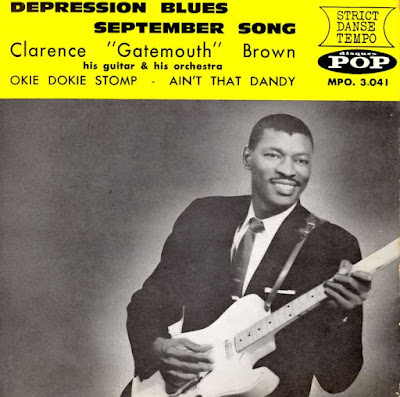220:- (24-Bit Limited Remaster Edition, utgången utgåva sen 2007. Svår James Brown album att hitta.)
Surely one of James Brown's most mysterious opuses: apparently never even reissued on *vinyl*, despite an impressive chart placement. Of course, the somewhat misleading packaging ("somewhat", meaning check out this review box title for the actual venue, another great landmark, though quite different in scale!), and subway station post-production effects, presumeably to make it sound like a huge auditorium event, added to the confusion. [The slow-running master tape didn't help either].
Then again, it's James Brown, who always found a special way of making order out of "chaos" - who else can keep a one-chord riff going for days, with mostly non-verbal emanations ("Hip Bag '67", track four)?
Yes, all of James Brown's live album have good audience sonic inreraction, and here the crowd is up in the mix, which adds to the excitement, although, in a sense, it also is a reminder that a big aspect of the live experience is in the visuals, and typically, though we can hear the crowd, there are no stills from the actual event.
One can imagine the beatific glow on the on the receiving end of the funk (though that came a few months later).
I say, without hesitation that this is Brown's most exciting live album (the Live in Dallas set has that heart-pounding and foot-stompin' "pop", but is *paced*). Following the greatest vocal introduction in recorded history, we're right into nearly-manic renditions of "Out Of Sight" and "Bring It Up", and the audience is already close to being emotionally spent. Cut five has a tremendous "Prisoner Of Love", his best on record.
The take recorded at the Apollo about five months later does not have the Soul or warmth this one has - he sounded a bit tired and distracted on that much better-known performance on "....Apollo, Vol. Two". Historians might presume that some of that "lower-impact" approach may have been by design. It's been written that sometime in 1967 JB considered retirement, and during that period changed the "pacing" of his shows. [When the Latin Casino recording was made, it seems that the over-the-top, beginning to end, approach was the key, so listeners can appreciate this intriquing piece of history].
Another tune fares better here than on the forementioned double-album: "It Maybe The Last Time". [For initiates, it is reminiscent of an earlier tune by the Staple Singers, "This Could Be The Last Time", and a later tune by the Rolling Stones]. This one has the power and compression, quite possibly noticed by Bad Company ("Can't Get Enough Of Your Love").
The gospel styled R & B-jazz hit "Ain't That A Groove" has the band at optimum capacity. (Another strong presumption: Paul McCartney referenced this particular track *and* "Please, Please, Please", prefacing the finale, "Bring It Up" [reprise]).
01. Out Of Sight
02. Bring It Up
03. Try Me
04. Let Yourself Go
05. Hip Bag '67
06. Prisoner Of Love
07. It May Be The Last Time
08. I Got You (I Feel Good)
09. Ain't That A Groove-Part 1-Ain't That A Groove-Part 2
10. Please,Please,Please
11. Bring It Up














